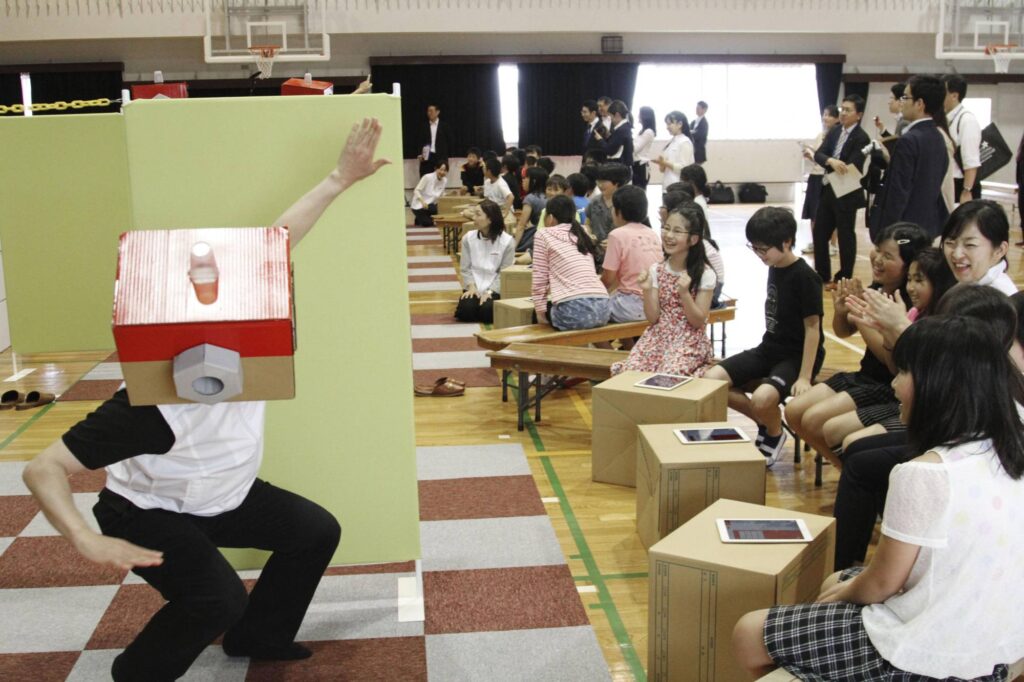OSAKA – An increasing number of elementary schools in Japan have started bolstering web programming education by making use of apps and classes offered by companies.
Programming education became a compulsory subject during the 2020 academic year, but many teachers have difficulty planning classes, making support from businesses with specialized skills more valuable.
For their part, companies hope to contribute as part of their corporate social responsibility activities while leveraging opportunities to gain better public understanding for their efforts and products.
According to the current school curriculum guidelines, elementary school children are supposed to learn how to think in an orderly way, draw conclusions and execute them systematically in order to achieve their goals, rather than placing emphasis on computer programming.
Since May 2019, employees of Murata Manufacturing, which makes electronic parts and robots in Nagaokakyo, Kyoto Prefecture, have been visiting elementary schools to teach programming.
Last year, classes were held at about 20 schools, with roughly 2,000 children participating.
Designed for students in the fourth, fifth and sixth grades of elementary school, the class is held over two periods for a total of 90 minutes. Teams of three operate “robots,” which are actually company employees acting out the programs students create. By combining motions such as “move one square forward” and “turn right 90 degrees” on a surface similar to a game board, the students command the workers and accomplish missions.
“By being able to move robots as they are programmed, we want children to feel a sense of achievement and become interested in things like manufacturing and craftsmanship,” an official at Murata Manufacturing said.
In the class, company workers sometimes run a cheerleading show by robots developed by the company. Some students have expressed interest, with one saying, “I’ve learned that there is such a great company near us.”
Major confectioner Ezaki Glico, based in Osaka, provides free teaching materials for programming classes that use its flagship chocolate product Pocky, baked pretzels coated with chocolate. Launched in August 2016, the teaching aid is now used by more than 560 schools. “We want to contribute to children’s growth by using sweets,” a public relations official at the company said.
Children arrange cards — each with a Pocky drawing— on a desk while considering the direction of the snack on the card and the cards’ order. They then read them via the cameras of tablet devices, so that characters on the app move according to the instructions indicated in the cards and aim for goals.
In response to a request from a school for teaching materials that can be used systematically, Ezaki Glico made it possible for schools to download a set of teaching materials from its website for free, together with teaching plans.
In addition, employees of the company sometimes visit schools to offer classes.
In February, in cooperation with parties such as the child care support section of the city government of Kadoma, Osaka Prefecture, the company held an after-school children’s class for first- and second-grade students. The children were very interested in the Pocky cards, getting a taste of programming by playing the games.
“Not only parents but also children themselves are very interested in programming,” an official of an after-school children’s club operator said. After learning the basic rules, some children continues to complete tasks on their own, according to the official.
An official at Ezaki Glico said, “We want children to become familiar with programming and enjoy it through classes.” An official of the city government’s child care support section said, “Although it (the company’s involvement) is not enough to support school education, we hope it offers a good opportunity.”
Article Credits: The Japan Times

Pingback: Child Abuse Safety Team works to break cycles of abuse, raise awareness - SLSV - A global media & CSR consultancy network